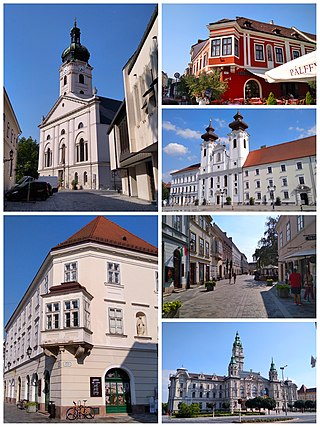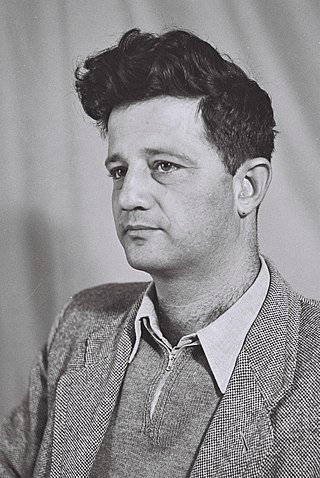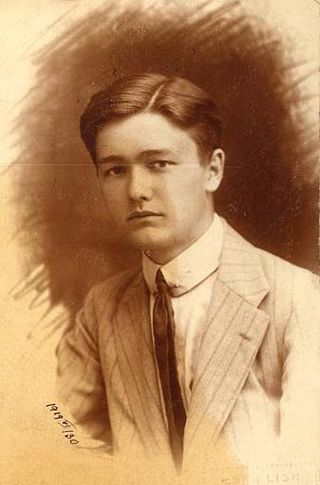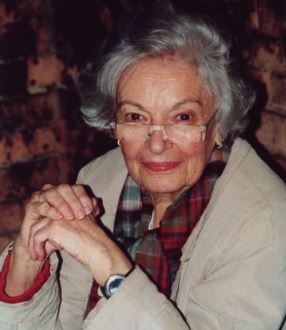
Countess Elizabeth Báthory de Ecsed was a Hungarian noblewoman and alleged serial killer from the Báthory family, who owned land in the Kingdom of Hungary. Báthory and four of her servants were accused of torturing and killing hundreds of girls and women from 1590 to 1610. Her servants were put on trial and convicted whereas Báthory was imprisoned within the Castle of Csejte (Čachtice), where she died under mysterious circumstances.

Anna Seghers, is the pseudonym of German writer Anna Reiling, who was notable for exploring and depicting the moral experience of the Second World War. Born into a Jewish family and married to a Hungarian Communist, Seghers escaped Nazi-controlled territory through wartime France. She was granted a visa and gained ship's passage to Mexico, where she lived in Mexico City (1941–47).

Győr is the main city of northwest Hungary, the capital of Győr-Moson-Sopron County and Western Transdanubia region, and – halfway between Budapest and Vienna – situated on one of the important roads of Central Europe. It is the sixth largest city in Hungary, and one of its seven main regional centres. The city has county rights.

Yizhar Smilansky, known by his pen name S. Yizhar, was an Israeli writer and politician. Widely regarded as one of the preeminent figures in Israeli literature, he was awarded the Israel Prize in 1959 for fine literature. He was also awarded several other prizes of national distinction. In his political life, Yizhar served in the Knesset under Mapai almost continuously from 1949–1967.

Glynnis Talken Campbell is an American historical romance author, composer, musician and voice actress, and is married to bass guitarist Richard Campbell. Glynnis Campbell graduated from California State University, Chico with a degree in Vocal Music Performance. Her first novel, My Champion, was nominated for a Romance Writers of America's RITA award for Best First Book and Best Long Historical Romance in 2001. In 2009, her novel Danger's Kiss, received the "Book Buyers Best Award for Historical Romance." She has also written under the pen names Sarah McKerrigan and Kira Morgan.

Magda Szabó was a Hungarian novelist. Doctor of philology, she also wrote dramas, essays, studies, memoirs, poetry and children's literature. She was a founding member of the Digital Literary Academy, an online digital repository of Hungarian literature. She is the most translated Hungarian author, with publications in 42 countries and over 30 languages.
The influence of Countess Elizabeth Báthory in popular culture has been notable from the 18th century to the present day. Since her death, various myths and legends surrounding her story have preserved her as a prominent figure in folklore, literature, music, film, games and toys.

Iván Darvas was a Hungarian actor.

Another Way, is a 1982 Hungarian film directed by Károly Makk about an affair between two women. It is based on a semi-autobiographical novella Another Love by Erzsébet Galgóczi (1930–1989), who co-wrote the screenplay with Makk. It won the Best Actress award at the 1982 Cannes Film Festival for Jadwiga Jankowska-Cieślak and was nominated for the Palme d'Or.

Marina Anatolyevna Palei is a Russian-speaking Dutch writer, poet, and scriptwriter.

Noémi Ban was a Hungarian-born American Jew and survivor of the Holocaust. Later in life she was a Golden Apple Award-winning lecturer, public speaker, and teacher residing in Whatcom County, Washington.

László Németh was a Hungarian dentist, writer, dramatist and essayist. He was born in Nagybánya the son of József Németh (1873–1946) and Vilma Gaál (1879–1957). Over the Christmas of 1925, he married Ella Démusz (1905–1989), the daughter of János Démusz, a keeper of a public house. Between 1926 and 1944 they had six daughters, but two of them died in infancy. In 1959 he visited the Soviet Union. In the last part of his life he lived and worked in Tihany. He died from a stroke on 3 March 1975 in Budapest and was buried in Farkasréti Cemetery, Budapest, where he shares a grave with his wife.
Another Love may refer to:

Noémi Kiss is a Hungarian writer, whose works have been translated into English, German, Bulgarian, Romanian and Serbian. The German press considered Kiss as one of the most promising writers of her generation.

Hilda Emília Gizella Gobbi was an award-winning Hungarian actress, known for her portrayals of elderly women. One of her most beloved performances was as Aunt Szabo in the radio soap opera The Szabo Family. A resistance member during World War II, she attempted to facilitate the reconstruction of the National Theatre by sponsoring a fundraising drive. Committed to her craft, she founded the Árpád Horváth Actor's College (1947), a home to care for elderly actors named after Mari Jászai (1948), a second actor's home named after Árpád Ódry (1950), the Gizi Bajor Actor's Museum (1952), and bequeathed her Patkó Villa to the National Theater for the purposes of creating a theater.

Hédi Temessy was a Hungarian actress. Active for over 50 years, she appeared on stage, in films, and on television. Her significant roles include playing Márta in Gergely Csiky's The Grandmother.

Dr. Erzsébet Lanczendorfer is a Hungarian physician and politician, member of the National Assembly (MP) from Fidesz–KDNP Győr-Moson-Sopron County Regional List between 2006 and 2014.

Elisabeth Ruttkay was a Hungarian-born, naturalized Austrian citizen, who was an archaeologist specializing in New Stone Age and Bronze Age studies in Austria. She was the winner of both the Lower Austria Promotion Prize and the Austrian Cross of Honour for Science and Art.















